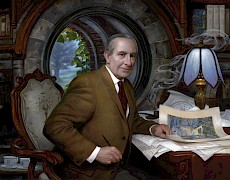☜ Click for full post text.
This is one in a series of posts where the content is provided by a guest who has graciously answered five questions about their experience as a Tolkien fan.
To see the idea behind this project, or if you are interested in sharing your own, visit the project homepage. If you enjoy this series, please consider helping us fund the project using the support page.
I want to thank Donato Giancola for allowing me to use his artwork for this project. Prints are available on his website!
Now, on to Graeme Cheadle’s responses:
1. How were you introduced to Tolkien’s work?
I was first introduced to Tolkien’s work as a child. Both my parents had read and enjoyed The Hobbit and The Lord of the Rings in the late ’60s or early ’70s, and my mother in particular was given a copy of The Fellowship of the Ring, I think (or perhaps it was the entire trilogy) by a friend when she had a serious illness and was recuperating in hospital. Years later, when my siblings and I had been born but were still quite young, she’d tell us about hobbits and Black Riders when we were on camping trips, and the small hints I got from those stories fascinated me. I think we also had a companion book to the 1978 Bakshi animated film adaption of The Lord of the Rings at home, and a copy of The Father Christmas Letters, though my brother and sister and I didn’t really get the significance of them at the time. My mom later read The Hobbit to us, and eventually I read The Lord of the Rings myself one summer, and I was hooked.
2. What is your favorite part of Tolkien’s work?
It’s difficult to put this into words, because there is so much I could mention. I think what keeps me coming back is the intensely believable “reality” of Tolkien’s invented worlds. They’ve always seemed very real to me, and I’ve always wanted to visit and even live in them. Tolkien himself said something about the attraction of what he called the “unattainable vistas” of his worlds, “the glimpses of a large history in the background, an attraction like that of viewing far off an unvisited island, or seeing the towers of a distant city gleaming in a sunlit mist.” You get the feeling when reading The Lord of the Rings, or even The Hobbit, of a much larger, vaster, and incredibly older *history* behind them, both internal and external, to the places and characters that Tolkien describes, and to which some of the characters look back, whether it be Aragorn singing the Lay of Leithian to the hobbits or Elrond astonishing Frodo by saying he remembered The War of the Last Alliance, and indeed the War of Wrath itself. Most casual readers never find out a lot about these things, but they seem very real and fully formed, by both Tolkien and his characters. This “realism” always intensely attracted me to his works.
3. What is your fondest experience of Tolkien’s work?
This is very difficult too. I suppose my favourite memory was the first time I read The Lord of the Rings at 13 or 14 years old; in some ways I’ve been trying to recapture that magic ever since, for the past 30 years. More recently however, the highlight of my Tolkien experience was visiting Oxford in early 2019, seeing some of the places he lived and worked, visiting his grave, and, best of all, having a pint in the room he used to drink in at The Eagle and Child with C.S. Lewis and the rest of the Inklings, in a chair by the fire, reading “The Fall of Gondolin,” on his birthday (his 127th), which was also my birthday (my 41st). I think that’s about as “peak Tolkien” as you can get, unless you could visit Middle-earth or talk to the professor himself.
4. Has the way you approach Tolkien’s work changed over time?
I would say yes, because at first my appreciation was very much tied to the narrative: I just wanted to know what happened, and how things get resolved. Eventually that led to me wanting to know more about the worlds in which the events take place, as much as I could, and I read The Silmarillion and parts of The History of Middle-earth series. In both high school and university I started to analyze the tales in a more academic and scholarly way, and this interest has persisted to the present day, hence my research into podcasts, all kinds of books, articles, talks, etc., about both the man and his works. But the purely narrative draw has never really diminished for me either.
5. Would you ever recommend Tolkien’s work? Why/Why not?
Absolutely, and in fact I do all the time. Anyone who knows me much at all knows about my Tolkien fascination, and I certainly recommend the books to friends for the pure enjoyment I think they bring. I look forward to teaching my young niece and nephew all about The Hobbit and The Lord of the Rings in a few years, and I even bring Tolkien up occasionally in my professional life, as a teacher of English as a Second Language.
You can read more from Graeme on Facebook!
